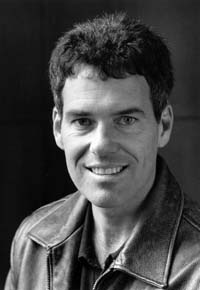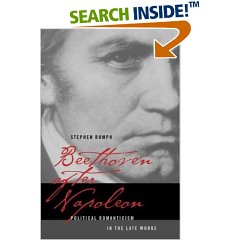 I want the whole world to know about Stephen Rumph. His voice is absolutely amazing. I wrote about it in my review of Skagit Opera’s Carmen. I went online to track him down and found out he’s not only an amazing vocalist, but active in music research (which I’ve listed below).
I want the whole world to know about Stephen Rumph. His voice is absolutely amazing. I wrote about it in my review of Skagit Opera’s Carmen. I went online to track him down and found out he’s not only an amazing vocalist, but active in music research (which I’ve listed below).
There are artists that are good, and artists that are talented, and artists that entertain us. But every once in a while you see an artist perform that touches the depth of your soul. That’s what Rumph’s performances do for me.
Stephen Rumph can take a note and morph it into so many different textures. It’s note a note anymore; it’s a living entity by itself. Well, read my review above, I don’t want to blather on and repeat myself. (Did I tell you he is AMAZING?)
I’m jealous he got an education at Oberlin. I had applied to Oberlin after high school and wasn’t accepted. I auditioned for voice, piano and composition. They turned me down for voice and piano, and said my compositions were illegible (and they still are! Thank God for computers!).
So as I continue to digress from my praises of Rumph I’m struck by a thought. Sometimes when I perform I have people come up to me and they are at a loss for words, and they look a bit silly during this interim. I’m not saying I’m so great, it’s just that if you perform a lot then their are a certain number of people you’re going to touch at a deep root level (that’s the way it SHOULD work, anyway). So here I am on the other side of the fence, at a total loss to describe to you the beauty of this man’s voice.
I guess it’s like when you laugh at your friends for being tongue twisted when they see a star they admire, then they laugh at you when it’s a star YOU admire. So right now, Stephen Rumph is my star. I hope he rocks the opera world big time.
His book: Beethoven After Napoleon – is available from Amazon.com
ABOUT THE BOOK
Beethoven After Napoleon
Book Description
 In this provocative analysis of Beethoven’s late style, Stephen Rumph demonstrates how deeply political events shaped the composer’s music, from his early enthusiasm for the French Revolution to his later entrenchment during the Napoleonic era. Impressive in its breadth of research as well as for its devotion to interdisciplinary work in music history, Beethoven after Napoleon challenges accepted views by illustrating the influence of German Romantic political thought in the formation of the artist’s mature style. Beethoven’s political views, Rumph argues, were not quite as liberal as many have assumed. While scholars agree that the works of the Napoleonic era such as the Eroica Symphony or Fidelio embody enlightened, revolutionary ideals of progress, freedom, and humanism, Beethoven’s later works have attracted less political commentary. Rumph contends that the later works show clear affinities with a native German ideology that exalted history, religion, and the organic totality of state and society. He claims that as the Napoleonic Wars plunged Europe into political and economic turmoil, Beethoven’s growing antipathy to the French mirrored the experience of his Romantic contemporaries. Rumph maintains that Beethoven’s turn inward is no pessimistic retreat but a positive affirmation of new conservative ideals.
In this provocative analysis of Beethoven’s late style, Stephen Rumph demonstrates how deeply political events shaped the composer’s music, from his early enthusiasm for the French Revolution to his later entrenchment during the Napoleonic era. Impressive in its breadth of research as well as for its devotion to interdisciplinary work in music history, Beethoven after Napoleon challenges accepted views by illustrating the influence of German Romantic political thought in the formation of the artist’s mature style. Beethoven’s political views, Rumph argues, were not quite as liberal as many have assumed. While scholars agree that the works of the Napoleonic era such as the Eroica Symphony or Fidelio embody enlightened, revolutionary ideals of progress, freedom, and humanism, Beethoven’s later works have attracted less political commentary. Rumph contends that the later works show clear affinities with a native German ideology that exalted history, religion, and the organic totality of state and society. He claims that as the Napoleonic Wars plunged Europe into political and economic turmoil, Beethoven’s growing antipathy to the French mirrored the experience of his Romantic contemporaries. Rumph maintains that Beethoven’s turn inward is no pessimistic retreat but a positive affirmation of new conservative ideals.
From the Inside Flap
“A brilliant and unfailingly provocative reading of Beethoven’s music. Rumph challenges and refines our views of the subject, reinterpreting overly familiar music in striking new ways. Wonderful critical and interpretive observations abound; the author writes with great imagination and flair.”–Scott Burnham, author of Beethoven Hero
“Rumph shows at last the extent to which Beethoven’s late period, the period of his most spiritual and ‘inward’ music, was a response to political change. In effect his book is an extended retort to E. T. A. Hoffmann’s two-centuries-old claim that Beethoven’s kingdom was not of this world–and it’s about time! Rumph’s argument will be resisted by Hoffmann’s many heirs; but it is most compelling, not least because it answers so many long-standing questions about ‘the music itself’ and clears up so many misconceptions about the nature of musical romanticism.”–Richard Taruskin, Class of 1955 Professor of Music, University of California, Berkeley
.
Staff Bio from University of Washington
Stephen Rumph joined the School of Music faculty in autumn 2002. He earned a B.M. degree in voice from the Oberlin Conservatory and his M.A. and Ph.D. in musicology from the University of California, Berkeley. Prior to coming to UW, Rumph lectured in music history at both Berkeley and the San Francisco Conservatory of Music.He has published articles in Nineteenth-Century Music and the Journal of Musicology. His book, Beethoven After Napoleon, a political study of the composer’s late works, was published in summer 2004 by University of California Press. Rumph is currently researching Mozart’s absorption of sacred music, in the context of Enlightenment aesthetics and language theory.
In addition to his scholarly work, Rumph has sung leading tenor roles, including Rodolfo, Hoffmann, Lenski, Tamino, and the Duke of Mantua, with West Bay Opera, Berkeley Opera, Pocket Opera, Livermore Valley Opera and other companies throughout the San Francisco Bay Area.
I Google Stephen Rumph and get Conrad Askland? Never know where you’ll turn up!
I work for the Orcas Island Chamber Music Festival and have lots of Googling duties…
If you loved Stephen Rumph in Carmen, you will be ecstatic by his performance as Hoffmann in Puget Sound Opera’s Tales of Hoffman. He is flawless throughout. There are two more performances: Friday, Nov. 3 at 7:30 and Sunday, Nov. 5 at 3 pm. This is an outstanding production with universally great singers, a good orchestra, and nice staging. Unfortunately, the house was probably less than half full yesterday. McIntyre Hall in Mount Vernon is a jewel of a facility and this opera company deserves support. Even the least expensive seats ($25) are fine. I urge everyone who likes classical music and the arts to try to get to this opera. You won’t be sorry.
Puget Sound Opera was previously known as Skagit Opera and the name change may be confusing to some who have followed this company–which has become increasingly good with each performance (two a year).